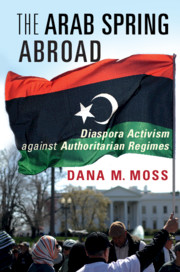Book contents
- The Arab Spring Abroad
- Cambridge Studies in Contentious Politics
- The Arab Spring Abroad
- Copyright page
- Contents
- Figures
- Tables
- Acknowledgments
- A Note on Transliteration
- Abbreviations
- Introduction
- 1 Diaspora Activism and the Dynamics of Voice
- 2 Exit from Authoritarianism
- 3 Silenced and Split
- 4 Coming Out and Coming Together
- 5 Voice for Rebellion and Relief
- 6 Converting Resources to the Cause
- 7 Gaining Geopolitical Support
- Conclusion
- Methodological Appendix
- References
- Index
- Series page
5 - Voice for Rebellion and Relief
- The Arab Spring Abroad
- Cambridge Studies in Contentious Politics
- The Arab Spring Abroad
- Copyright page
- Contents
- Figures
- Tables
- Acknowledgments
- A Note on Transliteration
- Abbreviations
- Introduction
- 1 Diaspora Activism and the Dynamics of Voice
- 2 Exit from Authoritarianism
- 3 Silenced and Split
- 4 Coming Out and Coming Together
- 5 Voice for Rebellion and Relief
- 6 Converting Resources to the Cause
- 7 Gaining Geopolitical Support
- Conclusion
- Methodological Appendix
- References
- Index
- Series page
Summary
Chapter 5 describes differences in activists’ collective interventions for rebellion and relief. Moss demonstrates how diaspora movements adopted a common transnational repretoire of (1) broadcasting their allies’ plight to the outside world, (2) representing the cause to the media and policymakers, (3) brokering between allies, (4) remitting tangible and intangible resources homeward, and (5) volunteering in person on the front lines and along border zones. However, not all diaspora movements played a congruent role in the uprisings. While Libyans in the United States and Britain played what the author calls a "full-spectrum" role in the revolution for its duration, Syrians and Yemenis did not. The chapters to follow explain how and why.
Keywords
- Type
- Chapter
- Information
- The Arab Spring AbroadDiaspora Activism against Authoritarian Regimes, pp. 138 - 173Publisher: Cambridge University PressPrint publication year: 2021

